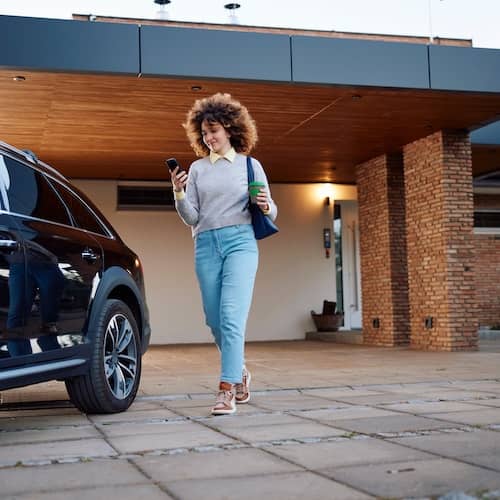Should you buy a car or house first?
Contributed by Karen Idelson
Dec 27, 2025
•7-minute read

Two of the most expensive things that people buy in their lifetimes are homes and cars. Many people rely on loans to afford these expensive purchases, so you may be debating whether you should buy a car or a house first and how your decision impacts your ability to buy the other.1
Any time you apply for a loan, your lender will examine your financial situation to determine if you can afford payments on the new loan, so getting a car loan can affect your ability to qualify for a mortgage. However, for many people, having a car is a necessity for holding a job and earning a steady income.
We’ll break down how to make the decision that is right for you.
How to decide if you should consider buying a car before buying a house
Deciding whether to buy a car before buying a home is a personal decision that is largely reliant on your reasons for buying a car.
When it could be a good idea
Buying a car before buying a home is a good idea when you need the car to serve as reliable transportation. Many people live in areas where public transit is unavailable and few things are within walking distance. Owning a car may be essential for doing things like buying food or getting to work. A car can also let you search for jobs in a wider range around your home.
If having a car can boost your income and your job stability, in some cases it can improve your financial position and make it easier to qualify for a mortgage later on.
When it could be a bad idea
Buying a car may add new financial obligations to your life. If you can’t afford to buy your car with cash, you’ll need to make your monthly auto loan payment, and you need to be able to handle the cost of gas and maintenance. Approximately more than 80% of new car buyers and more than 35% of used car buyers financed their purchases in late 2025.
That auto loan to your credit file will increase your debt-to-income ratio and may decrease your credit score, which could affect your ability to qualify for a mortgage. You might also slow your progress toward saving for a down payment because you’re putting more money toward your car and less toward saving.
Buying an expensive or luxury car with high payments only exacerbates these issues.
Unless you need the car to maintain your job or have another pressing reason, try to avoid buying one before you apply for a mortgage.
How does a car loan affect your ability to get a mortgage?
When you apply for a mortgage, you’ll go through an underwriting process. During this process, your lender will examine your financial situation and any debts you already have, including student loans, credit card debt, and auto loans.
The more you must pay toward your other debts each month, the less you have to put toward your monthly mortgage payment. That means lenders will be less willing to approve your application or may offer a smaller loan amount.
You may consider refinancing some of your debt, such as your auto loan, so it has a lower monthly payment, which may help you qualify for a mortgage. Having fewer or less expensive debts may make it easier to pay your mortgage.
Car loan vs. mortgage: Impact on credit
During the underwriting process, lenders will examine your credit report and check your credit score. This is a numerical score that gives lenders a quick idea of how trustworthy a borrower you are.
Qualifying for a mortgage may require a minimum credit score, typically 620 for a conventional loan and 580 for an FHA or VA loan. Though, as of November 2025, Fannie Mae has eliminated its minimum credit score requirement for home equity loans and home purchase loans. Instead they will evaluate the overall creditworthiness of an applicant when making lending approval decisions.
Adding a car loan to your credit report may impact multiple factors that influence your score:
- Amounts owed (30% of credit score)
- Payment history (35% of credit score)
- Length of credit history (15% of credit score)
- Credit mix (10% credit score)
If you have a low credit score, you might consider buying a car before getting a mortgage because the auto loan will give you a chance to improve your credit.
Car loan vs. mortgage: Impact on DTI
Your debt-to-income ratio is the percentage of your gross monthly income that you put toward debt payments.
For example, if you earn $6,000 a month and spend $700 on student loans, $400 on an auto loan, and $250 on credit card payments, your DTI ratio is ($700 + $400 + $250) / $6,000 = 22.5%.
Mortgage lenders may have limits on borrowers’ DTI ratios. For example, a lender may decline to offer a loan that will push you over a DTI ratio of 36%. That means that your other loans have a direct impact on how much you can borrow. The larger your car loan, the less you can get for a mortgage, whether that’s a conventional loan or any other kind of home loan.
Keep in mind that your auto loan is just one piece of the puzzle. Affordability is based on all of your debt obligations, not just the loan on your car.
Importance of budgeting for a car loan vs. a mortgage
Both a car and a home are major purchases, costing tens or hundreds of thousands of dollars. It’s important to balance your purchase with your budget and long-term financial goals.
Realistic budget
When buying a home or car, you need to set a realistic budget for the purchase.
Popular rules of thumb say not to spend any more than 10% of your monthly income on your auto loan and no more than 28% of your monthly income on a mortgage. It may even be better to aim below these limits to ensure you can handle surprise expenses or periods of income instability.
Down payments
When you buy a home or car, you usually make an upfront payment, called a down payment. Some types of loans, such as VA and USDA loans, do not have a down payment requirement. For homes, some types of loans allow a smaller down payment of 3.5%, while 20% is standard for new cars, and around 10% is generally what’s required for a used car.
The lower your down payment, the higher the risk of the loan. This is especially true for cars, which depreciate quickly, because you can wind up underwater on your loan.
Monthly expenses and payments
When you finance a home or car, you have to think about multiple costs and how they’ll affect your budget.
With a mortgage, you have to consider principal, interest, property taxes, and home insurance. You also have to pay for home maintenance, which is often about 1% of the home’s value each year.
With a car, you’ll have to pay sales and possibly ongoing excise taxes, as well as car insurance premiums, and buy gas to keep the car running. Over the course of a year, the typical car will generally need maintenance costing between $600 and $1,200 per month. This figure can be more if the car is older.
Impact on loan terms and rates
Car loan terms are shorter than mortgage terms, with auto loans usually lasting 4 to 7 years and mortgages generally lasting between 15 and 30 years.
However, auto loans usually have higher interest rates than home loans, with rates ranging based on factors such as credit score, DTI ratio, and the term of the loan. You can see today’s mortgage rates offered by Rocket Mortgage® here.
FAQ
Deciding whether to buy a car or a home first can be difficult, so consider these questions when making your choice.
How do you know if you need a car for your lifestyle?
If you don’t live in a pedestrian-friendly, accessible area or have access to public transit, a car can be important for getting to work and running essential errands. That means it’s likely better to buy a car first.
Is buying a car better if a home isn’t affordable in your area?
High real estate costs can make it difficult to purchase a home, and it can take years of saving. If you’re in that situation, it may not make sense to delay buying a car, especially if the car will help you increase your income by making it easier to find a higher paying job.
How much money do you need to have in savings?
How much money to save will depend on whether you choose to buy a car or a home first. For example, if you want to buy a home, you could need tens of thousands of dollars for the down payment to boost your home equity, cover closing costs, and pay for moving expenses.
With a car, you’ll still want to have a fair amount saved to deal with the down payment and potential maintenance.
Should you wait to refinance an auto loan if you want to buy a house?
When you refinance a loan or get a new loan, it can lower your credit score, so it may be better to wait to refinance if you’re about to close on a home. The exception is if your refinance will lower your monthly payment significantly and your DTI ratio is closer to the limit for qualifying for a mortgage.
Is it a bad idea to buy a car and a house at the same time?
Yes, in some cases, buying both a car and a home at the same time can be a bad idea. Buying both simultaneously can hurt your credit score, raise your DTI, and will complicate or delay your mortgage approval.
The bottom line: Whether to buy a car or a house first depends on your needs and goals
When it comes to deciding whether to buy a home or a car first, the right choice depends on your goals, finances, and living situation. You may want to take stock of your finances and why you want to buy a car or home, before deciding between the two.
If you’re ready to begin the homebuying process, you can see what you may qualify for by reaching out to Rocket Mortgage®.
1This article is for informational purposes only and is not intended to provide, and should not be relied on for, medical, legal, financial, or tax advice. You should consult with a qualified professional for advice specific to your situation. Consumers should independently verify that any services, products, or programs referenced meet their needs and comply with applicable requirements.

TJ Porter
TJ Porter has ten years of experience as a personal finance writer covering investing, banking, credit, and more.
TJ's interest in personal finance began as he looked for ways to stretch his own dollars through deals or reward points. In all of his writing, TJ aims to provide easy to understand and actionable content that can help readers make financial choices that work for them.
When he's not writing about finance, TJ enjoys games (of the video and board variety), cooking and reading.
Related resources

6-minute read
Should I pay off debt or save for a house?
Are you wondering if it’s better for you to pay off debt or save for a house first? Read this article for some key factors to consider before moving fo...
Read more

8-minute read
How to get a mortgage in 7 steps
Getting a mortgage can feel daunting if you’re a first-time home buyer. Learn the steps you must take to prepare for and successfully apply for a mortgage...
Read more

7-minute read
How to find the best mortgage for you
Are you thinking about buying a home but not sure how to choose the best home mortgage? Learn about your options and find the best mortgage for you.
Read more